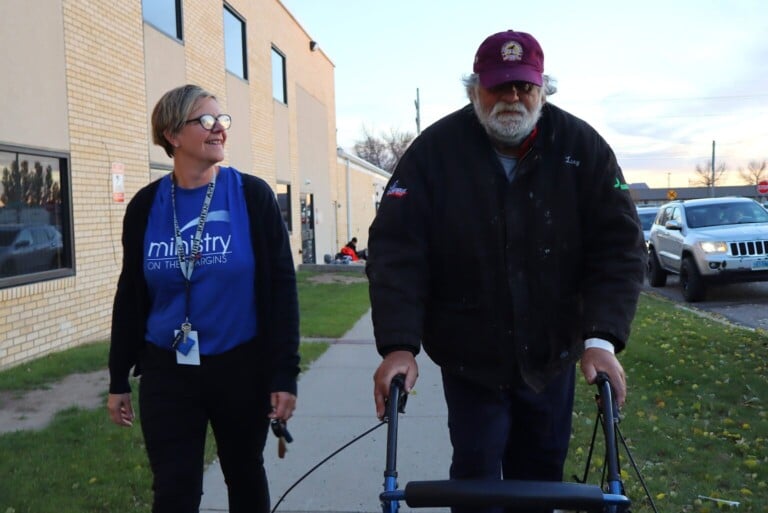More to be done, vet says, as North Dakota sees uptick in veteran homelessness

BISMARCK, N.D. (North Dakota Monitor) — Michael Hauck served as a staff sergeant, combat engineer for the U.S. Army in Germany, Egypt and the states of Georgia and Washington. After 12 years, he called it a career and transitioned to civilian life, but he never expected to find himself homeless at 64.
Hauck received an honorable discharge in 1992. Last year, he moved to Carson, North Dakota, about 70 miles southwest of Bismarck, and was living off his monthly Social Security benefit. But after battling hundreds of dollars in overdraft fees with his bank and bouncing rent checks, he was evicted in August. And the bank closed his account, he said, which hindered his ability to open another one and access his benefits, leading him to the streets.
“Why I survived is because of the Army, because I don’t quit,” Hauck said.
Hauck is among an increasing number of veterans experiencing homelessness in North Dakota.
In 2024, statewide and community nonprofits provided services to more than 3,800 people who were experiencing homelessness. Of those, 229 were veterans, according to the North Dakota Homeless Management Information System.
Homelessness among veterans has seen a noticeable increase in the past couple of years, said Commissioner Lonnie Wangen, head of the North Dakota Department of Veterans Services since 2008.
A few years ago, he said the department had enough resources, beds and assistance available to veterans at the time of their requests through statewide and community groups.
“We no longer do,” Wangen said. “I thought we had it licked.”
Since August, Hauck spent three weeks at Burleigh/Morton Detention Center, having been charged with misdemeanor theft for stealing a license plate. He was also admitted to a local hospital where blood clots were discovered in his heart. When he was discharged, Hauck said he had nowhere to go and ended up at Ministry on the Margins, a zero-barrier, overnight homeless shelter in Bismarck.
“I couldn’t get a motel room because I didn’t have a damn ID,” Hauck said.
Staff at the shelter helped Hauck track down a copy of his military separation paperwork, register for primary health care through the Department of Veterans Affairs and transferred his Social Security benefits to a debit card. Hauck was also able to register for a federal housing assistance program through the Department of Housing and Urban Development and the VA.
Kris Morrissette, behavioral health manager at Ministry on the Margins, said they also worked with Community Action Partnership of North Dakota, a nonprofit specializing in low-to-moderate income clients obtaining self-sufficiency, to set Hauck up in a hotel for up to 60 days while he waits for permanent housing.
Hauck is now on a wait list for an apartment at a reduced rent of $270 per month. He and staff are hopeful he will be housed within the next month.
“It just takes a while to get all those services in place,” Morrissette said.
Hauck said he would have never been able to complete all the paperwork for the services he is now receiving without the help of the shelter staff.
“I went from hell to heaven,” Hauck said.

Michael Hauck, 64, left, a homeless veteran, sits next to Kris Morrissette, behavioral health manager at Ministry on the Margins in Bismarck, before being transported to a nearby hotel as he awaits approval to move into a nearby apartment on Nov. 6, 2025. (Photo by Michael Achterling/North Dakota Monitor)
Earlier this year, state lawmakers authorized an additional $500,000 on top of the North Dakota Department of Veterans Services budget during the 2025 legislative session to address an uptick in veteran homelessness. Wangen said the department plans to make the funds available through a grant program that can catch veterans who may not qualify for other federal or community-based programs — those who “fall through the cracks.”
“I don’t like to see people coming back every month to help with rent,” Wangen said. “I really want to look at: How do we get them from point A to point B so they don’t have to come back?”
The homeless services provided in North Dakota include emergency shelter, rapid rehousing, transitional housing and coordinated entry services, which matches people and families to the housing program most suitable to their situation.
Dan Thorstad, chief administrator for the Department of Veterans Affairs, previously worked as a state service officer and veterans service officer for Cass County. He said one issue for veterans, or anyone facing homelessness, is North Dakota’s quick eviction timeline where landlords only need to provide a three-day notice of their intent to evict a tenant.
“You can’t get anything done in 72 hours,” Thorstad said.
If a renter falls behind on rent, he said, they are not able to find new housing until their previous balance is cleared.
“That becomes a sticking point because how do we get them housed now when they owe?” Thorstad said.
Michael Weyrauch, commander for North Dakota American Legion, said he sees higher rent prices as a barrier for veterans to find affordable housing, especially in the northwest part of the state.
Hauck said he had a message for decision-makers in the state: homeless services need more funding and the process needs to be simplified.
“I’ve never signed my name so many freaking times in my life,” he said. “And I thought the Army was bad.”
Hauck also encouraged portable toilets and warming tents stationed in areas where homeless people gather to offer at least a shred of comfort during a difficult time.
In October, Bismarck police cited Hauck for indecent conduct, which stemmed from defecating in public.
“What’s so difficult about putting out porta potties?” Hauck said. “I don’t want to do it, but I don’t have a choice.”
Once he’s back on his feet, Hauck said he wants to help others escape homelessness like he did.
“If you kick them to the curb, then you’ve got to go and pick them up,” he said.
Wangen said any veteran struggling to find housing, or any other services, should call 988, the suicide and crisis lifeline, or 211, the information hotline for housing and other available community resources. He said FirstLink manages both helplines.
“988 will help you with anything,” Wangen said. “Financial problems, legal problems, you need food assistance, rent, all the way to your mental health issues, they can answer it and help you with legitimate resources, which is great, just the one call.”
North Dakota Monitor reporter Michael Achterling can be reached at machterling@northdakotamonitor.com.






